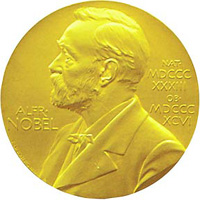Three Americans win Nobel economics prize

Americans Leonid Hurwicz, Eric S. Maskin and Roger B. Myerson won the Nobel Memorial Prize in Economic Sciences on Monday for their theory explaining situations in which markets work and others in which they don't.
The three researchers "laid the foundations of mechanism design theory," which plays a central role in contemporary economics and political science, the Royal Swedish Academy of Sciences said.
"Mechanism design theory, initiated by Leonid Hurwicz and further developed by Eric Maskin and Roger Myerson, has greatly enhanced our understanding of optimal allocation mechanisms," the academy said, "accounting for individuals' incentives and private information."
Their theory lets economists, governments and businesses "distinguish situations in which markets work well from those in which they do not," the academy said in its citation.
"It is a huge honor, I'm just overwhelmed to have my name on that list," Myerson told Sweden's TV4 network.
Hurwicz, 90, is the oldest person Nobel prize winner ever, the academy said. The Moscow-born researcher is a professor of economics at the University of Minnesota in Minneapolis. Maskin, 56, is professor at the Institute for Advanced Study at Princeton, New Jersey; and Myerson, 56, is a professor at the University of Chicago in Illinois.
The academy said their research helps explain mechanisms and decision-making procedures involved in economic transactions, for example, what insurance polices will provide the best coverage without inviting misuse.
The economics award is not one of the original Nobel Prizes. It was created in 1968 by the Swedish central bank in Nobel's memory.
Last year American Edmund S. Phelps won the prize for explaining the relationship between inflation and unemployment, work that has had a profound impact on macroeconomic policy.
Nobel Prize winners receive 10 million Swedish kronor (US$1.5 million; EUR1.1 million), a gold medal and a diploma from the Swedish king on Dec. 10, the anniversary of Nobel's death in 1896.
The other prizes were announced last week, with the Nobel Prize in medicine going to Americans Mario R. Capecchi and Oliver Smithies, and Briton Sir Martin J. Evans, for groundbreaking discoveries that led to a powerful technique for manipulating mouse genes.
France's Albert Fert and German Peter Gruenberg won the physics award for discovering a phenomenon that enables computers and digital music players to store reams of data on ever-shrinking hard disks.
Gerhard Ertl of Germany won the chemistry prize for studies of chemical reactions on solid surfaces, which are key to understanding questions such as why the ozone layer is thinning.
Britain's Doris Lessing won the literature prize, and former U.S. Vice President Al Gore and the U.N.'s Intergovernmental Panel on Climate Change won the 2007 Nobel Peace Prize for their efforts to spread awareness of man-made climate change.
Subscribe to Pravda.Ru Telegram channel, Facebook, RSS!


